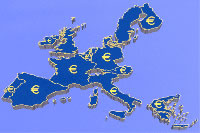The European Commission's new president, Jose Manuel Barroso, said in a newspaper interview that he intended to take into account Germany's economic interests and problems in the planned reform of the Stability and Growth Pact. "I can understand very well Germany's concerns," Barroso told the business daily Handelsblatt. "German unification was a historic, but also a very costly task. Furthermore, Germany is the biggest net contributor to the EU," the Portuguese EU commission chief said.
Germany has tranferred an estimated 1.5 trillion euros (1.95 trillion dollars) to the former communist eastern part of the country since unification in 1990. The stability pact, drawn up in 1997 largely at Germany's own behest, stipulates that eurozone countries are not allowed to run up public deficits in excess of 3.0 percent of gross domestic product (GDP).
But the German deficit has been in breach of that limit since 2002 and looks set to do again both this year and next year. With an increasing number of eurozone countries falling foul of the
3.0-percent rule, a campaign has been launched, spear-headed by Germany and France, for a reform of the stability pact. Barroso also believed that the pact should be "interpreted more
economically and more flexibility". He said: "We must find a way of fine-tuning the pact in order to take the effects of economic cycles on deficits more into account."
Meanwhile in Italy, the Italian newspaper La Repubblica quoted him as saying in an interview that the pact could be modified but not changed fundamentally. "One can certainly increase the margin of flexibility for countries with an improved performance but the solution to the problem is not to challenge the essence of the pact," he said.
And he told the Italian newspaper Corriere della Sera that "the stability pact cannot be dismantled...which is what would happen if the calculations were no longer to include investment expenditure" such as spending on research, innovation and infrastructure. Barroso said that there were two approaches. One held that so many changes should be made that the pact would end up losing its core conditions, the other that nothing should be changed.
"My opinion is that a middle way has to be found," he said, adding that "if a government wants to reduce taxes, it must also reduce expenditure".




 By: N. Peter Kramer
By: N. Peter Kramer
